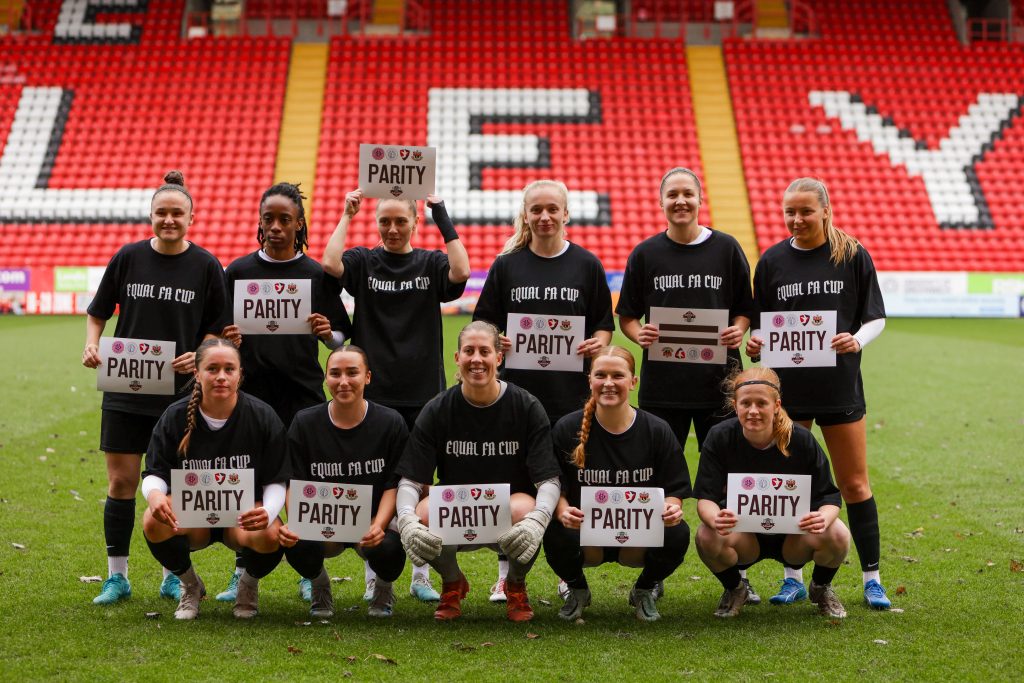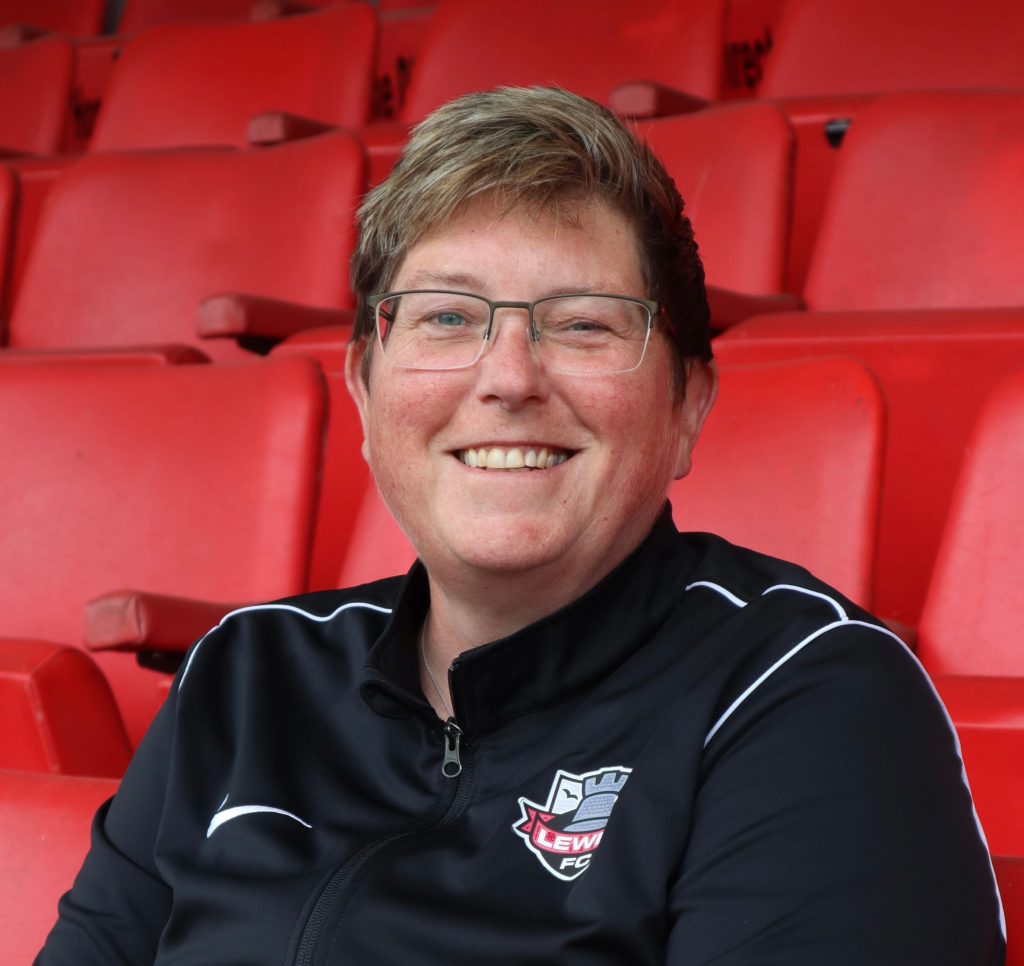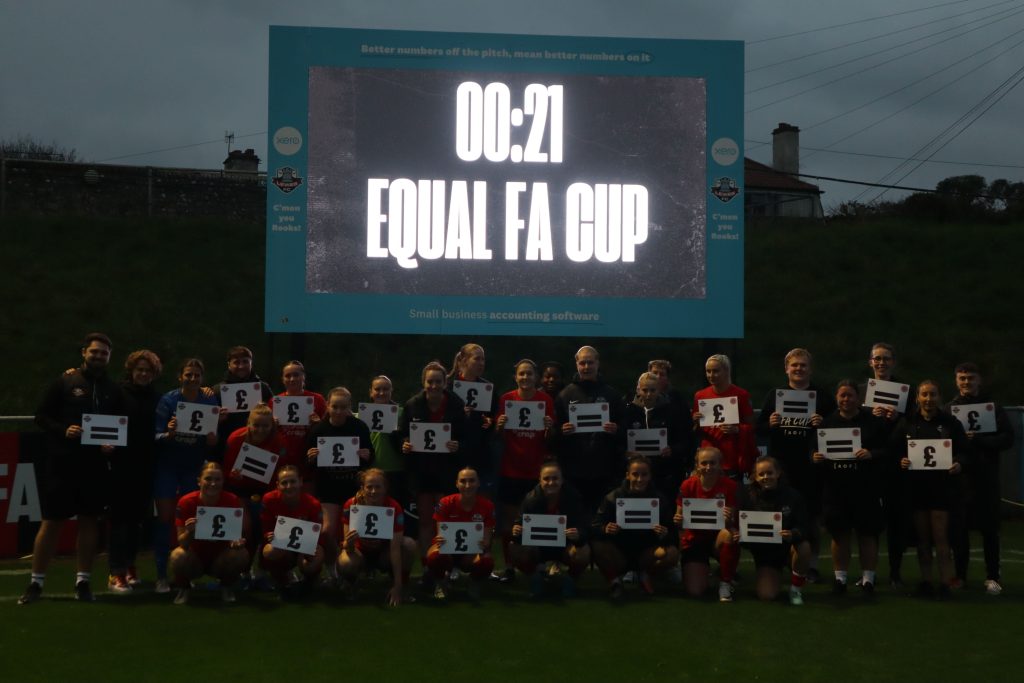
When Lewes take to the field against Corsham Town in the first round proper of the Women’s FA Cup on Sunday, there’ll be the usual fizz of excitement around the stadium that’s inevitable when it comes to the great cup competition.
But there’ll also be an undercurrent of what the club’s head of women’s football Lynne Burrell calls “rebel spirit”, which she says marks both the club and the town, as they voice once again their call for an Equal FA Cup.
Lewes have long been a stand-out club, adopting the unofficial nickname of Equality FC to describe the way they operate, with the same resources allocated to its men’s and women’s teams.
“What that looks like for us is that the women and the men play on the same pitch, training on the same venue.” Burrell explains to SheKicks.net. “We share all our resources, so we have a marketing person, commercial person working across the whole club. Everything that comes into Lewes FC is divided equally between our men’s and women’s teams. This is not a club where the women’s team is an afterthought and you get the last slot in the 3G at 10 o’clock on a Wednesday. It’s what does the women’s team need? What does the men’s team need?
“We’re a little bit unusual in that the women’s team play at a higher level in the football pyramid than our men’s team do. The power balance and the dynamic between the two teams means that we can raise our voice as a club a little bit more. Some of my counterparts, I know, find it difficult sometimes to have these conversations because they’re attached to a [high-profile men’s] club and it’s very much ‘please don’t scare the authorities and don’t speak up too loudly.’
“But I think at Lewes, one of the things that we’re proud of being able to do is to use the power of football and community for social good.”
Lewes propose prize money per fixture for an Equal FA Cup
Lewes began campaigning for an Equal FA Cup in 2019, highlighting the huge discrepancy in prize money between the men’s and the women’s competitions. It began with an open letter in February of that year in which they pointed out that the total FA Cup prize fund for men’s teams that season was £30.25 million compared to a total Women’s FA Cup prize fund of £250,000.
Those figures have changed, with the women’s competition now boosted to £6 million, but the men’s still receives £20 million.
And it’s not just about the total prize pool; it’s also about how that money is allocated. Forty per cent of the total prize money in the men’s competition is given to the quarter-finals, semi-final and final, with Premier League teams receiving two-thirds of the entire prize fund.
That’s now mirrored in the women’s competition, with more than half of the prize fund being awarded for the fourth round onwards, when WSL teams come into the competition.
Lewes argue that it would transform the game from grassroots upwards if there were a fairer division of prize money – giving a boost to teams in the earlier rounds rather than to teams who are already raking in the money. They propose a model based on prize money per fixture, where that amount is split 75/25 between winner and loser in a match.
Burrell explains: “If this was happening in the regular workplace, it would be outrageous if we were saying, ‘Well, the bonuses that go to the men are X and the bonuses that go to women are, what, 365% less’. That’s not right. Just from a societal point of view, the imbalance and the gap was enormous.

“We’ve all seen those fairytales, haven’t we, in the men’s game, where a team lower down the pyramid gets to play a team much higher up. The prize money that they get is transformational. It actually allows the clubs to build.
“But there wasn’t the same scale of prize money in women’s games. The teams that benefited from it were really the ones that got to semi-finals and finals. The ability to transform the women’s game wasn’t really there, and yet it was the women’s game that probably needed that.
“It’s a fairer way of distributing prize money down the pyramid so that the whole pyramid benefits.”
Men’s clubs subsidising women’s teams: “That’s not a strategy”
Lynne points to the cost of a team travelling to an away game in the early stages of the Women’s FA Cup.
“If they stay overnight and they want to bring a goalkeeper coach and an analyst and their coaches and maybe a member of the backroom staff, operations person and a squad of 18 players, you get a coach and a hotel stay, there’s nothing left to invest back into the club,” she says.
The prize money for these games would perhaps not cover the cost of a club taking part in them – it is a stark illustration of the continuing expectation that women’s teams will be subsidised by a big, rich, men’s club.
“This suggestion that ‘Oh, the men can just dip into their pockets and if they’ve got a million pounds down the back of the sofa, maybe that can go across to the women’s team’ – that’s not a business plan,” says Lynne. “That’s not a strategy. That’s not going to work.”
Paula Howells on being a Lewes player: “Values are aligned with the club”
One of the most refreshing elements of a Lewes campaign is the genuine engagement from players. Paula Howells, a former England youth international, has now been at the club for six years following several years with London Bees. She was part of the squad that reached the quarter-finals of the FA Cup and faced Manchester United in 2023, which drew plenty of media attention not just for the match but for the Lewes message.
“That was a massive opportunity for us as a club to really get what we wanted to across so that we’d have more visibility of it.
“I’ve definitely always been aware, not just about the FA Cup, but [about] equality in general. That’s something that definitely drew me towards Lewes.”
And she loves being at a club where she can be vocal about what she believes in – knowing very well that other players elsewhere don’t have that ability.

“We have loads of people that come to us and really are on board with what we’re doing and they want to be a part of it, but their clubs don’t want to be a part of it.”
She points to an incident in last year’s competition where Lewes wanted to do a visible display of the Equal FA Cup campaign, but their opponents did not want to be involved – even though, Paula says, the players did.
“Players’ values don’t always align with the clubs, and it’s a horrible place to be, because I know that if I was to go to anybody at the club and I was passionate about something that I believed in, they would give me a place to be able to share that, they would give me the ability to be able to share whatever’s on my mind.
“That’s the way that football needs to go. People need to have a safe space to be able to speak about their opinions, and it will make players feel more comfortable as a player as well, just knowing that their values are aligned within the club.”
And as Lewes continue their campaign and highlight an ongoing injustice, they’ll also enjoy being part of a historic cup competition.
“I start getting excited more about the FA Cup than Christmas,” grins Paula.
Adds Lynne: “It’s such a thrill to be in the hat when the draws are done.
“You can’t buy that.”




